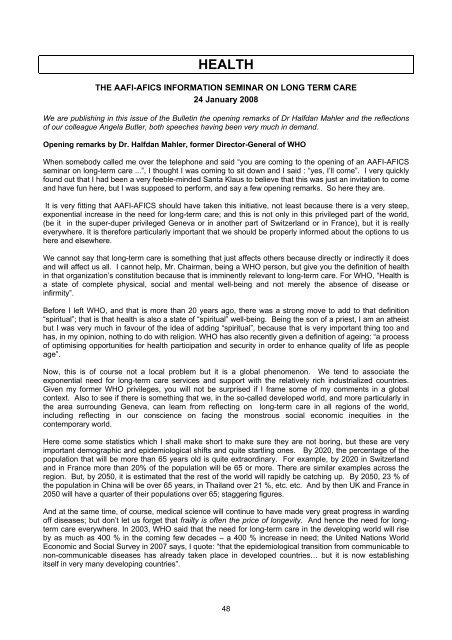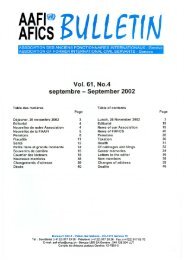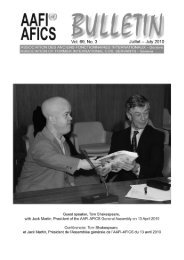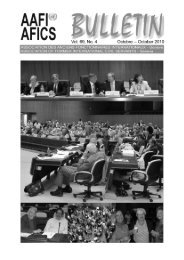VOL. 67, NO. 3 - AAFI-AFICS, Geneva - UNOG
VOL. 67, NO. 3 - AAFI-AFICS, Geneva - UNOG
VOL. 67, NO. 3 - AAFI-AFICS, Geneva - UNOG
You also want an ePaper? Increase the reach of your titles
YUMPU automatically turns print PDFs into web optimized ePapers that Google loves.
HEALTH<br />
THE <strong>AAFI</strong>-<strong>AFICS</strong> INFORMATION SEMINAR ON LONG TERM CARE<br />
24 January 2008<br />
We are publishing in this issue of the Bulletin the opening remarks of Dr Halfdan Mahler and the reflections<br />
of our colleague Angela Butler, both speeches having been very much in demand.<br />
Opening remarks by Dr. Halfdan Mahler, former Director-General of WHO<br />
When somebody called me over the telephone and said “you are coming to the opening of an <strong>AAFI</strong>-<strong>AFICS</strong><br />
seminar on long-term care ...”, I thought I was coming to sit down and I said : “yes, I’ll come”. I very quickly<br />
found out that I had been a very feeble-minded Santa Klaus to believe that this was just an invitation to come<br />
and have fun here, but I was supposed to perform, and say a few opening remarks. So here they are.<br />
It is very fitting that <strong>AAFI</strong>-<strong>AFICS</strong> should have taken this initiative, not least because there is a very steep,<br />
exponential increase in the need for long-term care; and this is not only in this privileged part of the world,<br />
(be it in the super-duper privileged <strong>Geneva</strong> or in another part of Switzerland or in France), but it is really<br />
everywhere. It is therefore particularly important that we should be properly informed about the options to us<br />
here and elsewhere.<br />
We cannot say that long-term care is something that just affects others because directly or indirectly it does<br />
and will affect us all. I cannot help, Mr. Chairman, being a WHO person, but give you the definition of health<br />
in that organization’s constitution because that is imminently relevant to long-term care. For WHO, “Health is<br />
a state of complete physical, social and mental well-being and not merely the absence of disease or<br />
infirmity”.<br />
Before I left WHO, and that is more than 20 years ago, there was a strong move to add to that definition<br />
“spiritual”; that is that health is also a state of “spiritual” well-being. Being the son of a priest, I am an atheist<br />
but I was very much in favour of the idea of adding “spiritual”, because that is very important thing too and<br />
has, in my opinion, nothing to do with religion. WHO has also recently given a definition of ageing: “a process<br />
of optimising opportunities for health participation and security in order to enhance quality of life as people<br />
age”.<br />
Now, this is of course not a local problem but it is a global phenomenon. We tend to associate the<br />
exponential need for long-term care services and support with the relatively rich industrialized countries.<br />
Given my former WHO privileges, you will not be surprised if I frame some of my comments in a global<br />
context. Also to see if there is something that we, in the so-called developed world, and more particularly in<br />
the area surrounding <strong>Geneva</strong>, can learn from reflecting on long-term care in all regions of the world,<br />
including reflecting in our conscience on facing the monstrous social economic inequities in the<br />
contemporary world.<br />
Here come some statistics which I shall make short to make sure they are not boring, but these are very<br />
important demographic and epidemiological shifts and quite startling ones. By 2020, the percentage of the<br />
population that will be more than 65 years old is quite extraordinary. For example, by 2020 in Switzerland<br />
and in France more than 20% of the population will be 65 or more. There are similar examples across the<br />
region. But, by 2050, it is estimated that the rest of the world will rapidly be catching up. By 2050, 23 % of<br />
the population in China will be over 65 years, in Thailand over 21 %, etc. etc. And by then UK and France in<br />
2050 will have a quarter of their populations over 65; staggering figures.<br />
And at the same time, of course, medical science will continue to have made very great progress in warding<br />
off diseases; but don’t let us forget that frailty is often the price of longevity. And hence the need for longterm<br />
care everywhere. In 2003, WHO said that the need for long-term care in the developing world will rise<br />
by as much as 400 % in the coming few decades – a 400 % increase in need; the United Nations World<br />
Economic and Social Survey in 2007 says, I quote: “that the epidemiological transition from communicable to<br />
non-communicable diseases has already taken place in developed countries… but it is now establishing<br />
itself in very many developing countries”.<br />
48
















